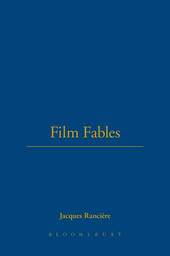
|
Film Fables
Paperback / softback
Main Details
| Title |
Film Fables
|
| Authors and Contributors |
By (author) Jacques Ranciere
|
|
Translated by Emiliano Battista
|
| Series | Talking Images |
|---|
| Physical Properties |
| Format:Paperback / softback | | Pages:208 | | Dimensions(mm): Height 234,Width 156 |
|
| Category/Genre | Film theory and criticism |
|---|
| ISBN/Barcode |
9781845201685
|
| Classifications | Dewey:791.43 |
|---|
| Audience | | Postgraduate, Research & Scholarly | |
|---|
| Illustrations |
bibliography, index
|
|
Publishing Details |
| Publisher |
Bloomsbury Publishing PLC
|
| Imprint |
Berg Publishers
|
| Publication Date |
1 February 2006 |
| Publication Country |
United Kingdom
|
Description
Film Fables traces the history of modern cinema. Encyclopedic in scope, Film Fables is that rare work that manages to combine extraordinary breadth and analysis with a lyricism which attests time and again to a love of cinema. Jacques Ranciere moves effortlessly from Eisenstein's and Murnau's transition from theatre to film to Fritz Lang's confrontation with television, from the classical poetics of Mann's Westerns to Ray's romantic poetics of the image, from Rossellini's neo-realism to Deleuze's philosophy of the cinema and Marker's documentaries. The Film Fable shows us how, between its images and its stories, the cinema tells its truth.
Author Biography
Jacques Ranciere is Professor of Aesthetics and Politics at the University of Paris-VIII (St. Denis). His translated works include: The Politics of Aesthetics: The Limits of Art and Politics, The Philosopher and his Poor, Dis-agreement: Politics and Philosophy, and The Names of History. Translated from the French by Emiliano Battista, a doctoral student in Philosophy at the Catholic University of Leuven and a free-lance translator.
Reviews'A remarkable and beautiful book which, with immense elegance, sets aside the difficulties of film theory to recreate a liberating, critical and poetic history of cinema.' Adrian Rifkin, Professor of Visual Culture Media, Middlesex University and Editor of the Art History journal 'What really sets this book apart is Ranciere's gifts as a writer and a fine-grain critic. His lapidary style spins out sentences of lyrical balance and scintillating intellectual density, shedding the ungainly baggage of so many academic texts. ...Like all the best books by philosophers on cinema, Ranciere's encourages us at once to think and to see these images anew.' Film Comment 'A compelling study that will leave an enduring mark on film and media studies.' Tom Conley, Harvard University
|